Module 5 Unit 10 Then and now 课件(共92张PPT)
文档属性
| 名称 | Module 5 Unit 10 Then and now 课件(共92张PPT) |

|
|
| 格式 | pptx | ||
| 文件大小 | 21.4MB | ||
| 资源类型 | 试卷 | ||
| 版本资源 | 教科版(广州) | ||
| 科目 | 英语 | ||
| 更新时间 | 2023-12-15 09:23:51 | ||
图片预览

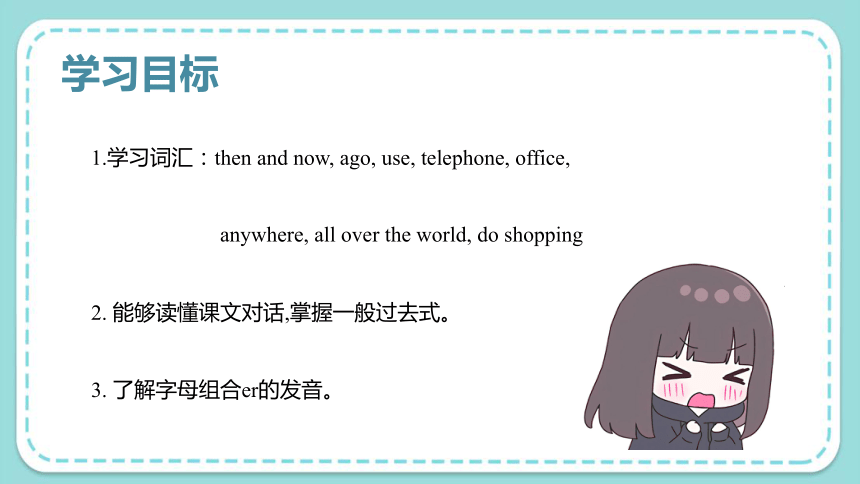
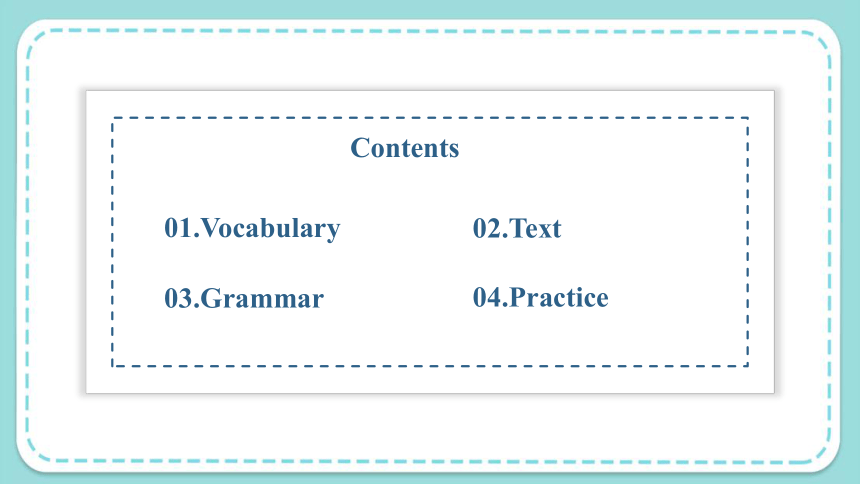
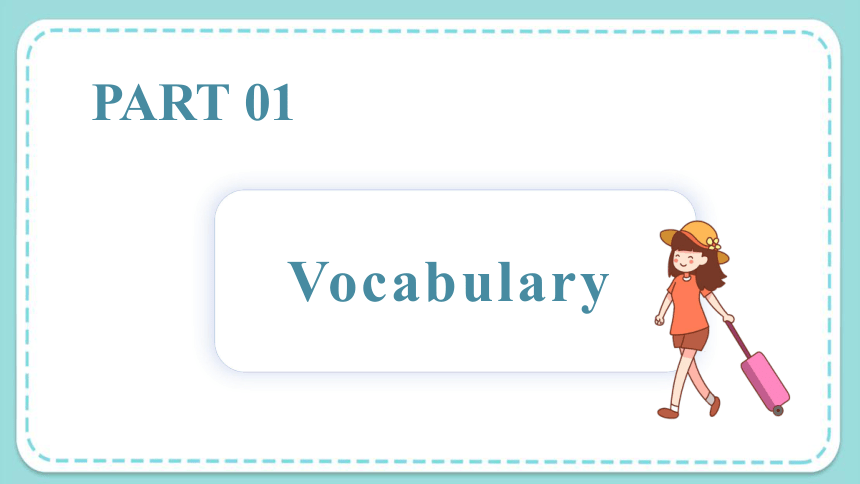
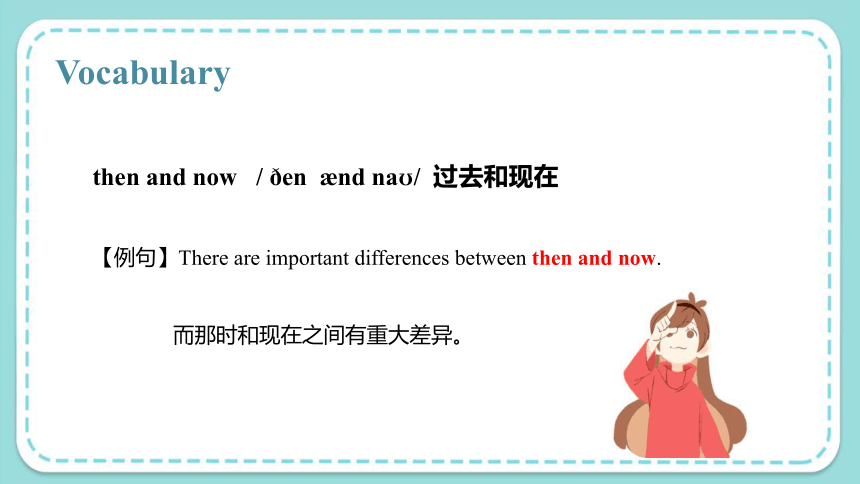
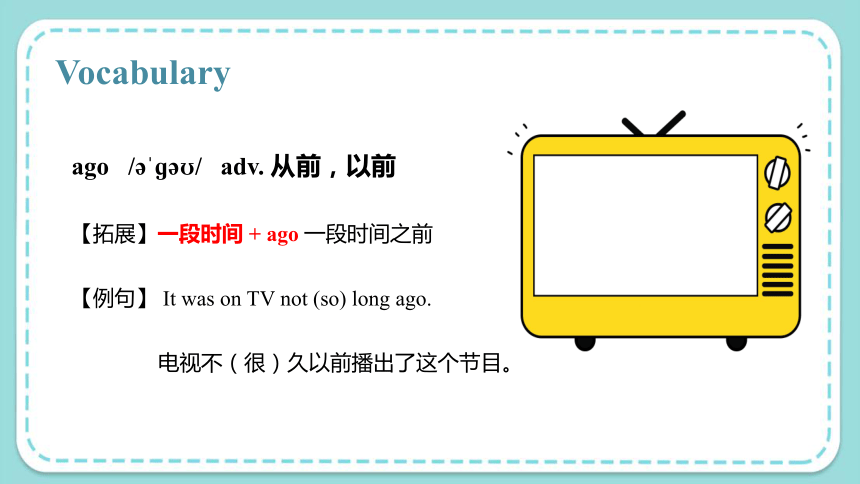
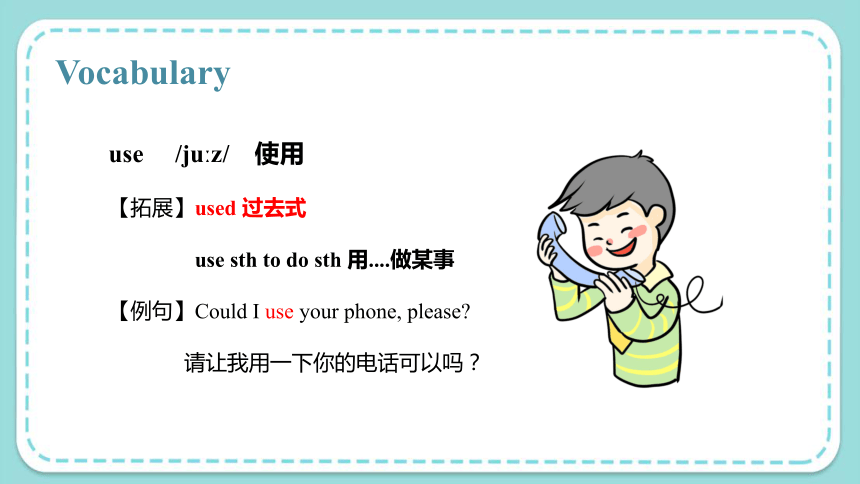
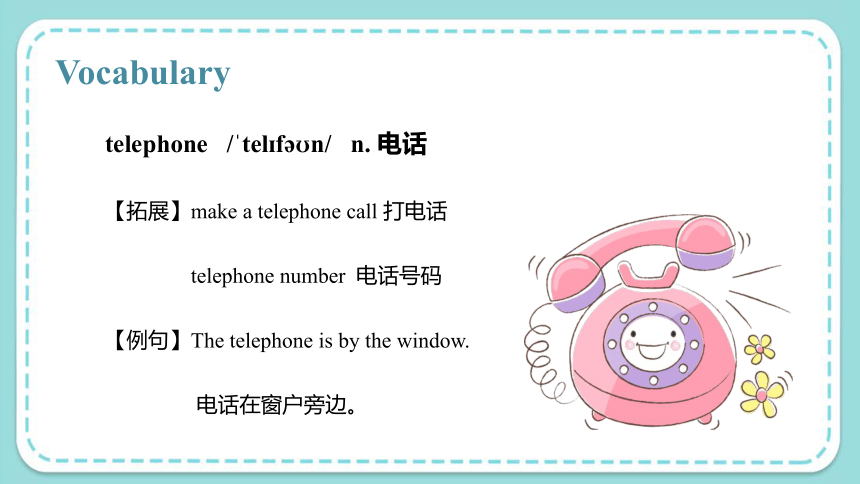
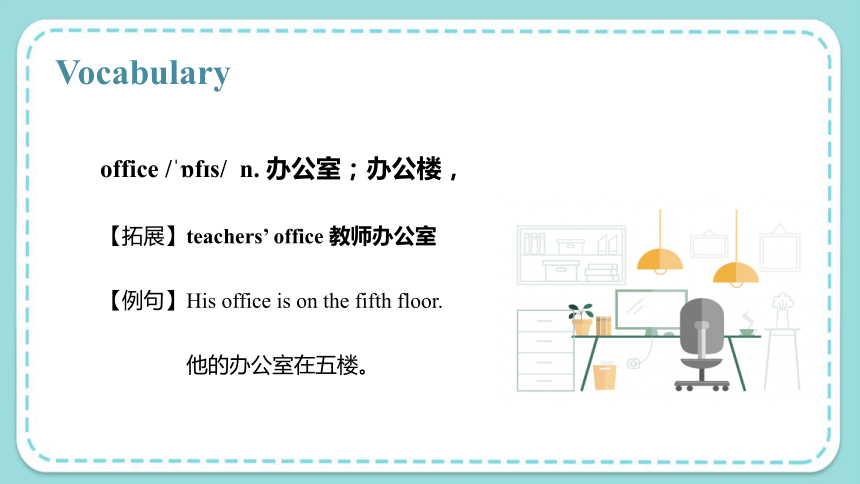
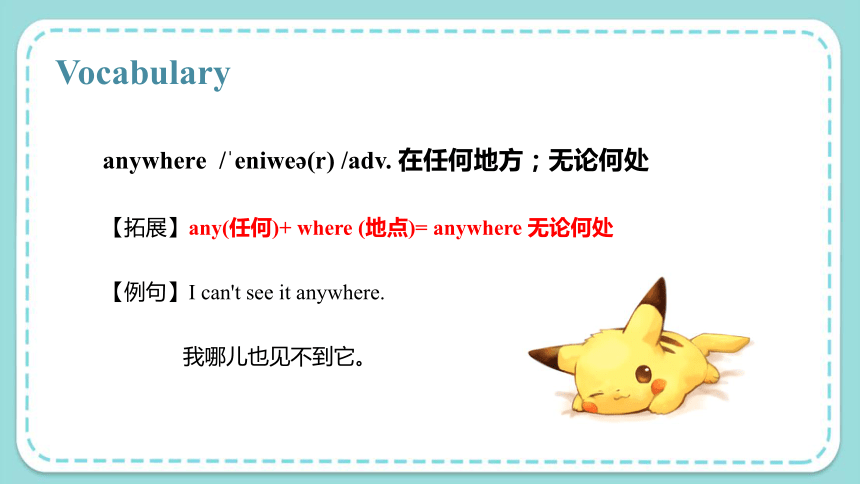
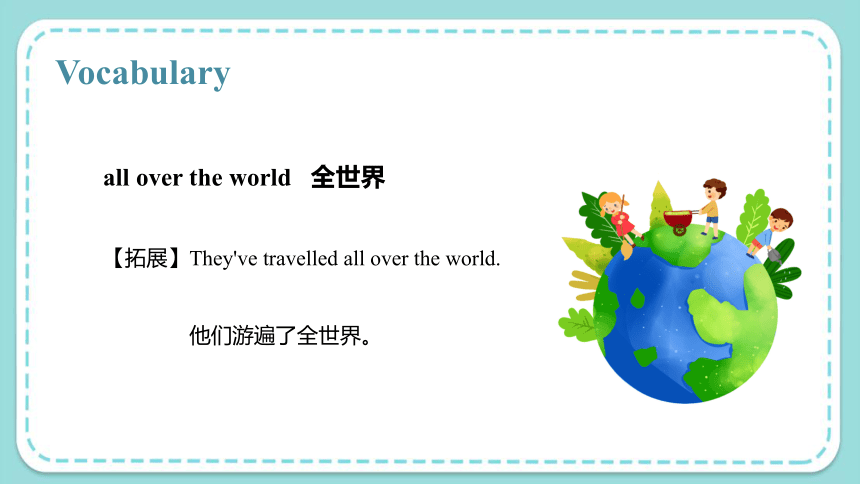

文档简介
(共92张PPT)
Module 5 Changes
Unit 10 Then and now
学习目标
1.学习词汇:then and now, ago, use, telephone, office,
anywhere, all over the world, do shopping
2. 能够读懂课文对话,掌握一般过去式。
3. 了解字母组合er的发音。
Contents
01.Vocabulary
02.Text
04.Practice
03.Grammar
行业PPT模板http:///hangye/
PART 01
Vocabulary
Vocabulary
then and now / en nd na / 过去和现在
【例句】There are important differences between then and now.
而那时和现在之间有重大差异。
Vocabulary
ago / ɡ / adv. 从前,以前
【拓展】一段时间 + ago 一段时间之前
【例句】 It was on TV not (so) long ago.
电视不(很)久以前播出了这个节目。
Vocabulary
use /ju z/ 使用
【拓展】used 过去式
use sth to do sth 用....做某事
【例句】Could I use your phone, please
请让我用一下你的电话可以吗?
Vocabulary
telephone / tel f n/ n. 电话
【拓展】make a telephone call 打电话
telephone number 电话号码
【例句】The telephone is by the window.
电话在窗户旁边。
Vocabulary
office / f s/ n. 办公室;办公楼,
【拓展】teachers’ office 教师办公室
【例句】His office is on the fifth floor.
他的办公室在五楼。
Vocabulary
anywhere / eniwe (r) /adv. 在任何地方;无论何处
【拓展】any(任何)+ where (地点)= anywhere 无论何处
【例句】I can't see it anywhere.
我哪儿也见不到它。
Vocabulary
all over the world 全世界
【拓展】They've travelled all over the world.
他们游遍了全世界。
Vocabulary
do shopping /du p / 购物
【拓展】go shopping 去逛街
【例句】We do our shopping on Saturdays.
我们星期六购物。
Vocabulary
village / v l d / n.村庄;村子
【拓展】Her books are about village life.
她的书是关于乡村生活的。
The village lies on a busy through road.
那村庄坐落在一条繁忙的直达公路上。
Vocabulary
nearby / n ba / prep. & adv. 附近
【拓展】near 附近
【例句】Her mother lived in a nearby town.
她母亲住在附近一个小镇上。
Vocabulary
far away 遥远
【拓展】far away from... 远离...
【例句】I come from far away.
我来自遥远的地方。
Vocabulary
store /st (r)/ 商店
【拓展】shop 商店
department /d pɑ tm nt/ store 百货商店
【例句】Could you drop me off at the department store
你能让我在百货公司下车吗?
重点短语
three years ago 三年前 far away 遥远
before then 在那以前 take the bus 乘公共汽车
a small village 一个小村庄 on the bus 在公共汽车上
in the countryside 在农村 go to work 去上班
重点短语
most of the people 大多数人 modern office buildings 现代化的办公楼
work on farms 在农场工作 department store 百货公司
walk to school 步行去上学 quiet life 安静的生活
every day 每天
PART 02
Text
Let's read
Three years ago, Ben came to live in China
with his parents. Before then, he lived in England
and life was very different.
When he was in England, Ben lived in a small village in the countryside. It had only two shops and most of the people worked on farms. Ben's village school was very small too. There were only 150 pupils. His home was nearby so he walked to school every day.
三天前
在这之前
一个小村庄
大部分
在农场
步行去学校
Let's read
But now, Ben lives in a big city. The city has many people,
cars and tall buildings.In the city, Ben goes to a very big school. It has more than 1000 pupils. His home is far away, so every day he takes the bus. On the bus, he sees people going to work in modern office buildings and department stores.
许多
超过
遥远
乘公交车
现代的
百货商店
Let's read
Ben loves the city. There are many things to do and he has lots of friends. But sometimes he misses the quiet life of his English village.
There be 有...
lots of = a lot of 许多 +可数名词复数/不可数名词
有时候
Answer the questions.
(1) When did Ben come to China
(2) Where did he live in England
(3) How did Ben go to school before
(4) Where do many people work in the city
(5) Why does Ben like the city
Fun with language.
1 Listen and tick or cross.
( )(1) The school is about 80 years old.
( )(2) There were three teaching buildings in the school before.
( )(3) There was no swimming pool in the school before.
( )(4) The library is in one of the three buildings.
( )(5) The school had a big playground in the past.
【知识考点一】
It had only two shops and most of the people worked on farms.
此句用于描述某人或某地在过去有什么。
句子结构为:主语+had+其他.
本句中的 most 意为“大多数;大部分”,常用结构为:most of+限定词+名词
例:Most of my friends live in the city,我大多数朋友住在城市里。
most 例句
many/much的最高级形式,意为“最多的”,“最高程度的”,“多半的”等意思,后面可跟复数可数名词。 Who has the mostneed of help 谁最需要帮助?Mostpeople think so.大多数人这么想。
用作名词,其意为“最大量”,“最高额”,“大多数”,“大部分”,“大多数人”。 Do the mostyou can.尽你的所能去做。The mostare on our side. 大多数人都支持我们。
用作副词,常置于两个音节以上的形容词或副词之前,与其一起构成该词的最高级形式。 Which lesson is themostdifficult in the book 这本书里哪一课最难?
【知识考点一】1. Most of the people worked on the farms.
most of people大多数人
【知识考点二】Three years ago, Ben came to live in China with his parents.
ago ……之前 ago前面加时间段,用来表示过去的时间。
e.g. ___________两年前_______________ 三个月前
【试试看】
1. Janet went to the cinema _______ _______ _______ .
Janet三个小时前去电影院了。
2. I was listening to the music _______ _______ _______ .
十分钟之前我正在听音乐。
【知识考点二】
On the bus, he sees people going to work in modern office buildings and department stores.
see sb. doing sth. “看见某人正在做某事” (动作正在进行)
see sb. do sth. “看见某人做过某事。” (动作已结束, 或者经常看到的动作)
Eg. (1) I see Jeremy cleaning the classroom. 我看见杰里米正在打扫课室。
(2) I see Jeremy clean the classroom. 我看见杰里米打扫课室。
【知识考点三】 His home is far away. 他的家很远。
词组 析义 例句
far away 后面不再接宾语。 They do not live far away.
far away from 有from,后面一定要跟宾语。 They live far away fromus.
数字+away from 300 meters away 300米远2 kilometers away 2公里远 My home is 20 kilometers away from the hospital.
【知识考点四】His home was nearby so he walked to school every day.
nearby prep. &adv. &adj. 附近
【词汇辨析】 nearby 与 near by
词汇 析义 例句
nearby 一般是形容词或副词,都有“在附近”的意思。 She came from a nearbyvillage.
她来自附近的村庄。
near by 词组,“在旁边”。 The shop is near byour school.
这个商店在我们学校旁边。
【知识考点五】
When he was in England, Ben lived in a small village in the countryside.
这句话中的 when 作连词,意为“当……的时候”,引导的从句可放于句首也可放于句末,此句也可表示为:
Benlived in a small village in the countryside when he was in England
注:表示过去发生的事情时,主句和 when 引导的从句都要用一般过去时。
【知识考点六】
There were only 150 pupils.
此句为 there be 句型的一般过去时形式,表示“某处以前有某些人/事物”,
句子结构为:There was/were+主语(人/物)+地点.
例:There was an old tree in our garden. 之前我们的花园里有一棵古树。
There were many people in the supermarket. 之前超市有很多人。
2 Read and tick or cross.
My hometown is very beautiful. It's famous for its fish and rice. And there is a wide river beside it.
In the past, it was a poor little town. There were no tall buildings and the only street was narrow. The river was dirty. Many people had no work. They lived a hard life. But there are great changes now. The town is much bigger. Its streets are wide. Different kinds of cars and buses run on the big streets. There are new factories, schools, hospitals, cinemas and many tall buildings. People live in big houses. Their life is rich and colourful. Now the river is clean again.
I love my hometown.
( )(1) My hometown is famous for fish and rice.
( )(2) My hometown was a big and rich town before.
( )(3) My hometown now has big, wide and busy streets.
( )(4) There are many new tall buildings now.
( )(5) The river is dirty but has a lot of fish now.
Read and tick or cross.
be famous for 因为……而出名;以……闻名
如:It’s famous for its fish and rice.
辨析:be famous for, be famous as, be famous to
1). be famous as 后一般跟 人,表“做为......人而闻名”
如:Lu Xun is famous as a great writer.
成龙作为一名演员而闻名。___________________________________________________
be famous for 因为……而出名;以……闻名
2). be famous for 后一般跟事物 ,表“因/由于......而闻名”
如:Lu Xun is famous for his great novels.
刘德华因他的歌曲而闻名。___________________________________
3). be famous to 后一般跟 人,表“对......是熟悉的”,“为......所熟知的”
如:Yao Ming is famous to most young people.
TFboys 为人们所熟知。___________________________________
Look and say.
Story time
What were/was...like...
stay at home 待在家
love doing sth 喜爱做某事
Story time
1. go to the library 去图书馆
2. all the time 一直
Story time
1. more than ... 多于...
1. on Earth 究竟,到底
Did you know
PART 03
Grammar
一般过去时
定义:过去某一时间发生的“动作”或存在的“状态”。
1. He was excited yesterday. 主、系、表
2. He telephoned me four times yesterday. 主、谓、宾
3. He took a cake and ate it quickly. 主、谓、宾
时间标志词
1. yesterday系列: the day before yesterday前天,
yesterday morning (afternoon, evening…)
2. last系列: last week (month, night …)
提示:yesterday evening与last night 区别记忆方法:长长—短短。yesterday, evening 两个单词均较长,last, night 两个单词都较短。
3. … ago系列: two years ago, three hours ago…
4. in+过去时间点系列: e.g. in 2002 in the past(在过去)
5. just now(刚才)
句式构成:
1.有”be”:“主+系+表”的结构 (先回顾一般现在时)
肯:主语+be(was, were)+表…。
否:主语+be(was, were)+not+表…。
疑:Was/Were +主+表…?
答:肯:Yes, 主+ was/were. 否:No, 主+wasn’t /weren’t.
Grammar
句型变化是:
I wasn't tired.我不累。
They weren't happy.他们不高兴。
肯定回答:Yes,主语+was/were.
否定回答:No,主语+wasn't/weren't.
动词原形 am am not is isn’t are aren’t
动词过去式 was wasn’t was wasn’t were weren’t
1. She _______ happy yesterday.
2. It _________ (be) Ben's birthday last Friday
3. The little dog _____ two years old this year.
4. It ____ (be) the 2nd of November yesterday.
5.They _______ glad to see each other last month.
6.他那时不在家._______________________________________ ____
I have changed in some ways. 我在一些方面已经有所改变了。
此句中的"have changed”是“现在完成时”时态。
现在完成时是指过去的动作或状态持续到现在并且已经完成,对现在造成的影响可能持续发生下去。
它的构成是:
主语+助动词(have/has)+动词的过去分词(done)
现在完成时态的句子结构
1)肯定句:主语 + have/has + 过去分词...
I have been to Paris. 我去过巴黎。
He has been to Paris. 他去过巴黎。
2)否定句:主语 + have/has + not + 过去分词...
I haven't been to Pairs. 我没去过巴黎。
He hasn't been to Pairs. 他没去过巴黎。
现在完成时态的句子结构
3)一般疑问句:Have/Has + 主语 + 过去分词..
Have you been to Pairs 你去过巴黎吗
---Yes,I have. 是的,我去过。---No,I haven't. 不,我没去过。
Has he been to Pairs 他去过巴黎吗
---Yes,he has. 是的,他去过。---No, he hasn't. 不,他没去过。
现在完成时态的句子结构
4)特殊问句:特殊疑问词 + have/has + 主语 + 过去分词...
What have you done 你都做了什么
When has she left 她什么时候走的
复合不定代词
复合不定代词的词义由前面的some-, any-, no- 决定。some- 某个,any- 任何一个,no- 没有,every- 每一个。-body和-one的复合代词只用于指人,-thing的复合代词用来指物。
(一) 1. some- /any- 的复合代词的用法与some, any 的用法基本一致
肯定句以及期待肯定回答的疑问句用some-,否定句和疑问句通常用any-。
e.g. They saw something in the sky.
Would you like something to drink
I wouldn’t say anything.
复合不定代词在句中可以作主语、表语和宾语
somebody/ someone (某人) anybody / anyone (任何人) nobody/no one (没有人) everyone/everybody
(每人)
something (某事) Anything (任何事) nobody/no one (没有什么) everything
(每件事)
Everyone gets tired sometimes. (作主语)
This is something you do before a test. (作表语)
Have you ever collected anything (作宾语)
(三) 复合不定代词作主语时,谓语用单数。
e.g. Is everyone here today
Everyone likes gifts.
(四) 复合不定代词的修饰语要置于复合不定代词之后。
e.g. I have something important to tell you.
Is there anything wrong with it
( )1. --- How is Helen in the new school
--- She is doing very well. There is _____________ to worry about.
A. something B. anything
C. nothing D. everything
( )2. I think can make Andy change his mind. He is such a person who never gives up easily.
A. something B. anything C. nothing D. everything
句式变化
句式变化中,常考的点有改为否定句;改为一般疑问句;改为选择疑问句;改为肯定句。
1. 改为否定句
【例题】Ben has lunch at home. (改为否定句)
Ben __________ ____________ lunch at home.
【解题方法】在情态动词和 be 动词后加 not;
在实义动词前加 don’t, doesn’t, didn’t.
【小试牛刀】
1)I did something yesterday.(改为否定句)
I __________ ____________ _____________ yesterday.
2)There are some birds in the sky. (改为否定句)
There _______________ _______________ birds in the sky.
【小试牛刀】
3)Please read Lesson One.(改为否定句)
______________ _______________ Lesson One,please.
4)I knew where he lived at that time.(改为否定句)
I ______________ _______________ where he lived at that time.
5)His sister likes bananas very much.(改为否定句)
His sister ______________ _______________ bananas very much.
改为一般疑问句
【例题】Henry did his homework carefully last night.(改为一般疑问句)
___________ he______________ his homework carefully last night
【解题方法】情态动词或 be 动词提到句首;行为动词需在句首加 do, does,did,行为动词用原形;陈述句为第 一人称时,改为疑问句将第一人称改为第二人称。
【小试牛刀】
1)They often run.(改为一般疑问句)
______________ ______________ _______________ _________________
2)She has to stay at home today. (改为一般疑问句)
____________she ___________ ____________ ______________ at home today
3)Andy had to wash clothes before five o'clock. (改为一般疑问句)
____________ Andy _____________ to wash clothes before five o'clock
改为选择疑问句
【例题】Tom's brother is cleaning the car. (用 bike 改为选择疑问句)
___________Tom's brother cleaning the car ______________cleaning the bike
【解题方法】选择疑问句的标志词, or
改为肯定句
【例题】They won't do gardening on Sunday morning. ( 改为肯定句)
They ___________ _____________ gardening on Sunday morning.
【解题方法】去掉助动词或 not 。
对划线部分提问
对划线部分提问,常考的点有对一段时间提问,对频率提问,对名词提问,对地点提问,对价钱提问, 对星期提问等。
1). 对一段时间提问
. 【例题】Autumn lasts for three months(就划线部分提问)
_________ ___________ ___________ autumn last
【解题方法】一段时间用 how long.
【小试牛刀】
1)--____________ __________may I keep the book
--You can keep it for two weeks.(就划线部分提问)
2)Peter has been in Guangzhou for twenty years.(对划线部分提问)
____________ ____________ has Peter been in Guangzhou
对一段距离提问。
【例题】It is only a ten-mile walk from the cinema to my school. (对划线部分提问
________ ________ is it from the cinema to your school
【解题方法】问距离用 How far
对频率的提问
【例题】You need to take this medicine three times a day. (就划线部分提问)
___________ __________ do I need to take this medicine
【解题方法】问频率,用 how often
【小试牛刀】
1)You should take this medicine twice a day就划线部分提问)
____________ ___________ should I take this medicine
2)Rich seldom takes exercise in the school. (对划线部分提问)
_________ __________ ___________ Rich ____________ exercise in the school
对名词的提问
【例题】My favourite subject is science(对划线部分提问)
_________ __________ ___________ favourite subject
【解题方法】表示什么用 what 提问。
【小试牛刀】
1)He has a piece of bread for breakfast every day.(就划线部分提问)
_________ _________ _________ __________ for breakfast every day
2)Lily likes spring best.(对划线部分提问)
____________ season__________ Lily like best
对地点的提问
【例题】Baby Bear looked in the bedroom(就划线部分提问)
_________ _________ Baby Bear __________
【解题方法】问地点,用特殊疑问词 where.
【小试牛刀】 I picked oranges on the farm last week.(对划线部分提问)
___________ ______________ you ________________ oranges last week
对时间,日期和星期的提问
【例题】It is June 29th today. (对划线部分提特殊疑问句)
___________ _______________ ________________ _________________ today
【解题方法】问星期:What day is it today
问日期:What date is it today
问时间用 when 或 what time
对价格提问
【例题】The meat is 13 yuan a kilo. (就划线部分提问)
__________ ___________ ______________ the meat a kilo
【解题方法】问价钱用 how much.
对原因提问
【例题】 I could not go to sleep last night because it was noisy outside.
(对划线部分提问)
________ _________ you go to sleep last night
【解题方法】问原因用 why.
【针对练习】
1. They are doing their housework .(分别改成一般疑问句和否定句)
____________________________________________________________
____________________________________________________________
23. I’m playing the football in the playground.(对划线部分进行提问)
_____________________________________________________________
PART 04
Practice
根据中文意思完成下列句子:
1. The man often ______ ______ ______(上网).
2. The child usually ______ ______ ______(走路上学).
3. The woman is ______ ______ ______(又矮又胖).
4. They ______ ______ ______(乘公共汽车)every day.
5. My mother ______ (工作)in the ______ ______(百货公司).
A. 根据中文意思完成下列句子:
6. We can see many ______ ______ ______(现代化的办公大楼)in the big city.
7. The girl was very ______ ______ ______.(这个女孩当时很有礼貌。)
8. There was a ______ ______(小村庄)in the mountain ______ ______ ______(很多年以前).
9. My new school is ______ ______ ______ ______ ______.(离我家很远).
10. Ben sometimes ______ ______ ______ ______ in the countryside. (有时候Ben想念村庄的宁静生活。)
用词的正确形式或根据首字母提示填空:
Mr White lived o______ a farm near N______Y______ two years a______. Mr and Ms White ______(live) with three children. They ______(had) a big house with three bedrooms and a big kitchen. There was a beautiful river near the farm. Mr White went fishing in the river when he was not b______.
Now he ______(work) in a s______ and ______(live) in an a apartment in New York C______. This apartment is much smaller t______ the house on the farm. There is only one bedroom, a small living room and a small kitchen.
选出与其它三项发音不同的选项。
( ) 1. A.loved B. thanked C. cooked D. pushed
( ) 2. A.beach B. climb C. umbrella D. begin
( ) 3. A. five B. phone C. play D. laugh
( ) 4. A.helped B. played C. bored D. cleaned
( ) 5.A.loved B. lived C. looked D. called
选择不同类的单词,把其字母编号写在题前的括号内。
( )1. A. office B. store C. school D. building
( )2.A.Guangzhou B. Shanghai C.England D. Yun Nan
( )3.A. pupil B. parent C. teacher D. people
( )4.A.live B. work C. walk D. life
( )5.A. took B. read C. see D. were
给下列单词分类,并把其字母编号写在相应的横线上。
A.short B. drew C. train D. watched E.nearby F. fat G. plane H. ago
I. quiet J. came K. ship L. away M. car N. then O.polite P . bought
1.副词:______________________________________________________
2.形容词:____________________________________________________
3.交通工具:__________________________________________________
4. 动词过去式:_________________________________________________
选择题。
( )1. The boy lived __________ a big farm with his parents..
A. on B. at C. in D. for
( )2. What ________ your old school like
A. is B. were C. was D. be
( )3. They ________ back home at five yesterday afternoon.
A. come B.came C. comes D. coming
( )4. My father __________ home at ten last night.
A. get B. gets C. getting D. got
( )5. Did you_________ a PE lesson last week
A. have B. had C. has D. having
( )6.The life ________ so different ten years ago.
A. were B. was C. is D. are
( ) 7. Is there _____ in today’s newspaper?
A. something important B. anything important C. important anything
( ) 8. We must keep our bodies ______.
A. heath B. healthy C. healthily
( ) 9. He helped his mother ________ the housework.
A. do B. does C.diday.
( )7. Most _________ the children like their teachers.
A.with B. for C. in D.of
( )8.We __________ school from morning to night yesterday.
A. stayed on B.stayed in C. stay at D. stayed at
( )9. The boy often sees the people________ to work on the bus.
A. goes B.going C. do D. go
( )10.They went to school ______foot before and now they go to school ______ bike.
A. on; by B. by; by C. by; on D. on; on
( )11. Kunming is famous ________ its spring.
A.at B.as C.for D. of
( )12. The girl _______ in that old house last year.
A.live B. lived C. lives D. living
( )13. -- Where _______ you _______this morning
-- I went to the supermarket to buy some food for dinner.
A.did; do B. do;go C.did; go D.did; went
( )14. _____ you ______ the film last night
A. Do; see B Did; see C. Did; saw D. Do; saw
( )15. Was he at work ________
A . now B. next week C. yesterday D. in the morning
You were away for thirty years!
Youfu was a young fisherman. One day, he went fishing by the river. At noon, he was tired and rested under a big tree by the river. There was a big hole in the tree. When he was sleeping, a young man came out from the hole. He invited Youfu to his home in the tree. Youfu followed him to a valley full of flowers.
The people there were happy and friendly.
They talked with Youfu and invited him to dinner. Youfu stayed in the valley for three days. He had a good time.
When Youfu came home, everything was different! His house wasn’t there! His friends weren’t there! What was the matter An old woman said, “Are you Youfu You went away thirty years ago. Where did you go ” He told the woman about the valley people. “I was there for only three days. Why do you say I went away thirty years ago ” The woman took Youfu to the river and said, “Look at yourself in the river. You are an old man now. You were away for thirty years!”
1. 根据短文内容,判断正(T)误(F).
( ) (1) Youfu was a school boy.
( ) (2) Youfu rested in the hole of the big tree.
( ) (3)There was a hole in the big tree.
( ) (4) A young man came to Youfu from the river.
( ) (5)The young man took Youfu into the hole in the tree.
( ) (6) The hole in the tree led to (通向)a valley.
( ) (7) Youfu stayed in the valley for four days.
2.根据故事填空。
When Youfu came home, everything was___________! His house wasn’t there! His ___________weren’t there! What was the matter An old woman said, “Are you Youfu You went away___________ago. Where did you go ” He told the woman about the people in the ___________. “I was there for only three___________. Why do you say I went away thirty years ago ” The woman took Youfu to the ___________and said, “Look at your beard. You are an___________now. You were___________for thirty years! ”
Thank you!
Module 5 Changes
Unit 10 Then and now
学习目标
1.学习词汇:then and now, ago, use, telephone, office,
anywhere, all over the world, do shopping
2. 能够读懂课文对话,掌握一般过去式。
3. 了解字母组合er的发音。
Contents
01.Vocabulary
02.Text
04.Practice
03.Grammar
行业PPT模板http:///hangye/
PART 01
Vocabulary
Vocabulary
then and now / en nd na / 过去和现在
【例句】There are important differences between then and now.
而那时和现在之间有重大差异。
Vocabulary
ago / ɡ / adv. 从前,以前
【拓展】一段时间 + ago 一段时间之前
【例句】 It was on TV not (so) long ago.
电视不(很)久以前播出了这个节目。
Vocabulary
use /ju z/ 使用
【拓展】used 过去式
use sth to do sth 用....做某事
【例句】Could I use your phone, please
请让我用一下你的电话可以吗?
Vocabulary
telephone / tel f n/ n. 电话
【拓展】make a telephone call 打电话
telephone number 电话号码
【例句】The telephone is by the window.
电话在窗户旁边。
Vocabulary
office / f s/ n. 办公室;办公楼,
【拓展】teachers’ office 教师办公室
【例句】His office is on the fifth floor.
他的办公室在五楼。
Vocabulary
anywhere / eniwe (r) /adv. 在任何地方;无论何处
【拓展】any(任何)+ where (地点)= anywhere 无论何处
【例句】I can't see it anywhere.
我哪儿也见不到它。
Vocabulary
all over the world 全世界
【拓展】They've travelled all over the world.
他们游遍了全世界。
Vocabulary
do shopping /du p / 购物
【拓展】go shopping 去逛街
【例句】We do our shopping on Saturdays.
我们星期六购物。
Vocabulary
village / v l d / n.村庄;村子
【拓展】Her books are about village life.
她的书是关于乡村生活的。
The village lies on a busy through road.
那村庄坐落在一条繁忙的直达公路上。
Vocabulary
nearby / n ba / prep. & adv. 附近
【拓展】near 附近
【例句】Her mother lived in a nearby town.
她母亲住在附近一个小镇上。
Vocabulary
far away 遥远
【拓展】far away from... 远离...
【例句】I come from far away.
我来自遥远的地方。
Vocabulary
store /st (r)/ 商店
【拓展】shop 商店
department /d pɑ tm nt/ store 百货商店
【例句】Could you drop me off at the department store
你能让我在百货公司下车吗?
重点短语
three years ago 三年前 far away 遥远
before then 在那以前 take the bus 乘公共汽车
a small village 一个小村庄 on the bus 在公共汽车上
in the countryside 在农村 go to work 去上班
重点短语
most of the people 大多数人 modern office buildings 现代化的办公楼
work on farms 在农场工作 department store 百货公司
walk to school 步行去上学 quiet life 安静的生活
every day 每天
PART 02
Text
Let's read
Three years ago, Ben came to live in China
with his parents. Before then, he lived in England
and life was very different.
When he was in England, Ben lived in a small village in the countryside. It had only two shops and most of the people worked on farms. Ben's village school was very small too. There were only 150 pupils. His home was nearby so he walked to school every day.
三天前
在这之前
一个小村庄
大部分
在农场
步行去学校
Let's read
But now, Ben lives in a big city. The city has many people,
cars and tall buildings.In the city, Ben goes to a very big school. It has more than 1000 pupils. His home is far away, so every day he takes the bus. On the bus, he sees people going to work in modern office buildings and department stores.
许多
超过
遥远
乘公交车
现代的
百货商店
Let's read
Ben loves the city. There are many things to do and he has lots of friends. But sometimes he misses the quiet life of his English village.
There be 有...
lots of = a lot of 许多 +可数名词复数/不可数名词
有时候
Answer the questions.
(1) When did Ben come to China
(2) Where did he live in England
(3) How did Ben go to school before
(4) Where do many people work in the city
(5) Why does Ben like the city
Fun with language.
1 Listen and tick or cross.
( )(1) The school is about 80 years old.
( )(2) There were three teaching buildings in the school before.
( )(3) There was no swimming pool in the school before.
( )(4) The library is in one of the three buildings.
( )(5) The school had a big playground in the past.
【知识考点一】
It had only two shops and most of the people worked on farms.
此句用于描述某人或某地在过去有什么。
句子结构为:主语+had+其他.
本句中的 most 意为“大多数;大部分”,常用结构为:most of+限定词+名词
例:Most of my friends live in the city,我大多数朋友住在城市里。
most 例句
many/much的最高级形式,意为“最多的”,“最高程度的”,“多半的”等意思,后面可跟复数可数名词。 Who has the mostneed of help 谁最需要帮助?Mostpeople think so.大多数人这么想。
用作名词,其意为“最大量”,“最高额”,“大多数”,“大部分”,“大多数人”。 Do the mostyou can.尽你的所能去做。The mostare on our side. 大多数人都支持我们。
用作副词,常置于两个音节以上的形容词或副词之前,与其一起构成该词的最高级形式。 Which lesson is themostdifficult in the book 这本书里哪一课最难?
【知识考点一】1. Most of the people worked on the farms.
most of people大多数人
【知识考点二】Three years ago, Ben came to live in China with his parents.
ago ……之前 ago前面加时间段,用来表示过去的时间。
e.g. ___________两年前_______________ 三个月前
【试试看】
1. Janet went to the cinema _______ _______ _______ .
Janet三个小时前去电影院了。
2. I was listening to the music _______ _______ _______ .
十分钟之前我正在听音乐。
【知识考点二】
On the bus, he sees people going to work in modern office buildings and department stores.
see sb. doing sth. “看见某人正在做某事” (动作正在进行)
see sb. do sth. “看见某人做过某事。” (动作已结束, 或者经常看到的动作)
Eg. (1) I see Jeremy cleaning the classroom. 我看见杰里米正在打扫课室。
(2) I see Jeremy clean the classroom. 我看见杰里米打扫课室。
【知识考点三】 His home is far away. 他的家很远。
词组 析义 例句
far away 后面不再接宾语。 They do not live far away.
far away from 有from,后面一定要跟宾语。 They live far away fromus.
数字+away from 300 meters away 300米远2 kilometers away 2公里远 My home is 20 kilometers away from the hospital.
【知识考点四】His home was nearby so he walked to school every day.
nearby prep. &adv. &adj. 附近
【词汇辨析】 nearby 与 near by
词汇 析义 例句
nearby 一般是形容词或副词,都有“在附近”的意思。 She came from a nearbyvillage.
她来自附近的村庄。
near by 词组,“在旁边”。 The shop is near byour school.
这个商店在我们学校旁边。
【知识考点五】
When he was in England, Ben lived in a small village in the countryside.
这句话中的 when 作连词,意为“当……的时候”,引导的从句可放于句首也可放于句末,此句也可表示为:
Benlived in a small village in the countryside when he was in England
注:表示过去发生的事情时,主句和 when 引导的从句都要用一般过去时。
【知识考点六】
There were only 150 pupils.
此句为 there be 句型的一般过去时形式,表示“某处以前有某些人/事物”,
句子结构为:There was/were+主语(人/物)+地点.
例:There was an old tree in our garden. 之前我们的花园里有一棵古树。
There were many people in the supermarket. 之前超市有很多人。
2 Read and tick or cross.
My hometown is very beautiful. It's famous for its fish and rice. And there is a wide river beside it.
In the past, it was a poor little town. There were no tall buildings and the only street was narrow. The river was dirty. Many people had no work. They lived a hard life. But there are great changes now. The town is much bigger. Its streets are wide. Different kinds of cars and buses run on the big streets. There are new factories, schools, hospitals, cinemas and many tall buildings. People live in big houses. Their life is rich and colourful. Now the river is clean again.
I love my hometown.
( )(1) My hometown is famous for fish and rice.
( )(2) My hometown was a big and rich town before.
( )(3) My hometown now has big, wide and busy streets.
( )(4) There are many new tall buildings now.
( )(5) The river is dirty but has a lot of fish now.
Read and tick or cross.
be famous for 因为……而出名;以……闻名
如:It’s famous for its fish and rice.
辨析:be famous for, be famous as, be famous to
1). be famous as 后一般跟 人,表“做为......人而闻名”
如:Lu Xun is famous as a great writer.
成龙作为一名演员而闻名。___________________________________________________
be famous for 因为……而出名;以……闻名
2). be famous for 后一般跟事物 ,表“因/由于......而闻名”
如:Lu Xun is famous for his great novels.
刘德华因他的歌曲而闻名。___________________________________
3). be famous to 后一般跟 人,表“对......是熟悉的”,“为......所熟知的”
如:Yao Ming is famous to most young people.
TFboys 为人们所熟知。___________________________________
Look and say.
Story time
What were/was...like...
stay at home 待在家
love doing sth 喜爱做某事
Story time
1. go to the library 去图书馆
2. all the time 一直
Story time
1. more than ... 多于...
1. on Earth 究竟,到底
Did you know
PART 03
Grammar
一般过去时
定义:过去某一时间发生的“动作”或存在的“状态”。
1. He was excited yesterday. 主、系、表
2. He telephoned me four times yesterday. 主、谓、宾
3. He took a cake and ate it quickly. 主、谓、宾
时间标志词
1. yesterday系列: the day before yesterday前天,
yesterday morning (afternoon, evening…)
2. last系列: last week (month, night …)
提示:yesterday evening与last night 区别记忆方法:长长—短短。yesterday, evening 两个单词均较长,last, night 两个单词都较短。
3. … ago系列: two years ago, three hours ago…
4. in+过去时间点系列: e.g. in 2002 in the past(在过去)
5. just now(刚才)
句式构成:
1.有”be”:“主+系+表”的结构 (先回顾一般现在时)
肯:主语+be(was, were)+表…。
否:主语+be(was, were)+not+表…。
疑:Was/Were +主+表…?
答:肯:Yes, 主+ was/were. 否:No, 主+wasn’t /weren’t.
Grammar
句型变化是:
I wasn't tired.我不累。
They weren't happy.他们不高兴。
肯定回答:Yes,主语+was/were.
否定回答:No,主语+wasn't/weren't.
动词原形 am am not is isn’t are aren’t
动词过去式 was wasn’t was wasn’t were weren’t
1. She _______ happy yesterday.
2. It _________ (be) Ben's birthday last Friday
3. The little dog _____ two years old this year.
4. It ____ (be) the 2nd of November yesterday.
5.They _______ glad to see each other last month.
6.他那时不在家._______________________________________ ____
I have changed in some ways. 我在一些方面已经有所改变了。
此句中的"have changed”是“现在完成时”时态。
现在完成时是指过去的动作或状态持续到现在并且已经完成,对现在造成的影响可能持续发生下去。
它的构成是:
主语+助动词(have/has)+动词的过去分词(done)
现在完成时态的句子结构
1)肯定句:主语 + have/has + 过去分词...
I have been to Paris. 我去过巴黎。
He has been to Paris. 他去过巴黎。
2)否定句:主语 + have/has + not + 过去分词...
I haven't been to Pairs. 我没去过巴黎。
He hasn't been to Pairs. 他没去过巴黎。
现在完成时态的句子结构
3)一般疑问句:Have/Has + 主语 + 过去分词..
Have you been to Pairs 你去过巴黎吗
---Yes,I have. 是的,我去过。---No,I haven't. 不,我没去过。
Has he been to Pairs 他去过巴黎吗
---Yes,he has. 是的,他去过。---No, he hasn't. 不,他没去过。
现在完成时态的句子结构
4)特殊问句:特殊疑问词 + have/has + 主语 + 过去分词...
What have you done 你都做了什么
When has she left 她什么时候走的
复合不定代词
复合不定代词的词义由前面的some-, any-, no- 决定。some- 某个,any- 任何一个,no- 没有,every- 每一个。-body和-one的复合代词只用于指人,-thing的复合代词用来指物。
(一) 1. some- /any- 的复合代词的用法与some, any 的用法基本一致
肯定句以及期待肯定回答的疑问句用some-,否定句和疑问句通常用any-。
e.g. They saw something in the sky.
Would you like something to drink
I wouldn’t say anything.
复合不定代词在句中可以作主语、表语和宾语
somebody/ someone (某人) anybody / anyone (任何人) nobody/no one (没有人) everyone/everybody
(每人)
something (某事) Anything (任何事) nobody/no one (没有什么) everything
(每件事)
Everyone gets tired sometimes. (作主语)
This is something you do before a test. (作表语)
Have you ever collected anything (作宾语)
(三) 复合不定代词作主语时,谓语用单数。
e.g. Is everyone here today
Everyone likes gifts.
(四) 复合不定代词的修饰语要置于复合不定代词之后。
e.g. I have something important to tell you.
Is there anything wrong with it
( )1. --- How is Helen in the new school
--- She is doing very well. There is _____________ to worry about.
A. something B. anything
C. nothing D. everything
( )2. I think can make Andy change his mind. He is such a person who never gives up easily.
A. something B. anything C. nothing D. everything
句式变化
句式变化中,常考的点有改为否定句;改为一般疑问句;改为选择疑问句;改为肯定句。
1. 改为否定句
【例题】Ben has lunch at home. (改为否定句)
Ben __________ ____________ lunch at home.
【解题方法】在情态动词和 be 动词后加 not;
在实义动词前加 don’t, doesn’t, didn’t.
【小试牛刀】
1)I did something yesterday.(改为否定句)
I __________ ____________ _____________ yesterday.
2)There are some birds in the sky. (改为否定句)
There _______________ _______________ birds in the sky.
【小试牛刀】
3)Please read Lesson One.(改为否定句)
______________ _______________ Lesson One,please.
4)I knew where he lived at that time.(改为否定句)
I ______________ _______________ where he lived at that time.
5)His sister likes bananas very much.(改为否定句)
His sister ______________ _______________ bananas very much.
改为一般疑问句
【例题】Henry did his homework carefully last night.(改为一般疑问句)
___________ he______________ his homework carefully last night
【解题方法】情态动词或 be 动词提到句首;行为动词需在句首加 do, does,did,行为动词用原形;陈述句为第 一人称时,改为疑问句将第一人称改为第二人称。
【小试牛刀】
1)They often run.(改为一般疑问句)
______________ ______________ _______________ _________________
2)She has to stay at home today. (改为一般疑问句)
____________she ___________ ____________ ______________ at home today
3)Andy had to wash clothes before five o'clock. (改为一般疑问句)
____________ Andy _____________ to wash clothes before five o'clock
改为选择疑问句
【例题】Tom's brother is cleaning the car. (用 bike 改为选择疑问句)
___________Tom's brother cleaning the car ______________cleaning the bike
【解题方法】选择疑问句的标志词, or
改为肯定句
【例题】They won't do gardening on Sunday morning. ( 改为肯定句)
They ___________ _____________ gardening on Sunday morning.
【解题方法】去掉助动词或 not 。
对划线部分提问
对划线部分提问,常考的点有对一段时间提问,对频率提问,对名词提问,对地点提问,对价钱提问, 对星期提问等。
1). 对一段时间提问
. 【例题】Autumn lasts for three months(就划线部分提问)
_________ ___________ ___________ autumn last
【解题方法】一段时间用 how long.
【小试牛刀】
1)--____________ __________may I keep the book
--You can keep it for two weeks.(就划线部分提问)
2)Peter has been in Guangzhou for twenty years.(对划线部分提问)
____________ ____________ has Peter been in Guangzhou
对一段距离提问。
【例题】It is only a ten-mile walk from the cinema to my school. (对划线部分提问
________ ________ is it from the cinema to your school
【解题方法】问距离用 How far
对频率的提问
【例题】You need to take this medicine three times a day. (就划线部分提问)
___________ __________ do I need to take this medicine
【解题方法】问频率,用 how often
【小试牛刀】
1)You should take this medicine twice a day就划线部分提问)
____________ ___________ should I take this medicine
2)Rich seldom takes exercise in the school. (对划线部分提问)
_________ __________ ___________ Rich ____________ exercise in the school
对名词的提问
【例题】My favourite subject is science(对划线部分提问)
_________ __________ ___________ favourite subject
【解题方法】表示什么用 what 提问。
【小试牛刀】
1)He has a piece of bread for breakfast every day.(就划线部分提问)
_________ _________ _________ __________ for breakfast every day
2)Lily likes spring best.(对划线部分提问)
____________ season__________ Lily like best
对地点的提问
【例题】Baby Bear looked in the bedroom(就划线部分提问)
_________ _________ Baby Bear __________
【解题方法】问地点,用特殊疑问词 where.
【小试牛刀】 I picked oranges on the farm last week.(对划线部分提问)
___________ ______________ you ________________ oranges last week
对时间,日期和星期的提问
【例题】It is June 29th today. (对划线部分提特殊疑问句)
___________ _______________ ________________ _________________ today
【解题方法】问星期:What day is it today
问日期:What date is it today
问时间用 when 或 what time
对价格提问
【例题】The meat is 13 yuan a kilo. (就划线部分提问)
__________ ___________ ______________ the meat a kilo
【解题方法】问价钱用 how much.
对原因提问
【例题】 I could not go to sleep last night because it was noisy outside.
(对划线部分提问)
________ _________ you go to sleep last night
【解题方法】问原因用 why.
【针对练习】
1. They are doing their housework .(分别改成一般疑问句和否定句)
____________________________________________________________
____________________________________________________________
23. I’m playing the football in the playground.(对划线部分进行提问)
_____________________________________________________________
PART 04
Practice
根据中文意思完成下列句子:
1. The man often ______ ______ ______(上网).
2. The child usually ______ ______ ______(走路上学).
3. The woman is ______ ______ ______(又矮又胖).
4. They ______ ______ ______(乘公共汽车)every day.
5. My mother ______ (工作)in the ______ ______(百货公司).
A. 根据中文意思完成下列句子:
6. We can see many ______ ______ ______(现代化的办公大楼)in the big city.
7. The girl was very ______ ______ ______.(这个女孩当时很有礼貌。)
8. There was a ______ ______(小村庄)in the mountain ______ ______ ______(很多年以前).
9. My new school is ______ ______ ______ ______ ______.(离我家很远).
10. Ben sometimes ______ ______ ______ ______ in the countryside. (有时候Ben想念村庄的宁静生活。)
用词的正确形式或根据首字母提示填空:
Mr White lived o______ a farm near N______Y______ two years a______. Mr and Ms White ______(live) with three children. They ______(had) a big house with three bedrooms and a big kitchen. There was a beautiful river near the farm. Mr White went fishing in the river when he was not b______.
Now he ______(work) in a s______ and ______(live) in an a apartment in New York C______. This apartment is much smaller t______ the house on the farm. There is only one bedroom, a small living room and a small kitchen.
选出与其它三项发音不同的选项。
( ) 1. A.loved B. thanked C. cooked D. pushed
( ) 2. A.beach B. climb C. umbrella D. begin
( ) 3. A. five B. phone C. play D. laugh
( ) 4. A.helped B. played C. bored D. cleaned
( ) 5.A.loved B. lived C. looked D. called
选择不同类的单词,把其字母编号写在题前的括号内。
( )1. A. office B. store C. school D. building
( )2.A.Guangzhou B. Shanghai C.England D. Yun Nan
( )3.A. pupil B. parent C. teacher D. people
( )4.A.live B. work C. walk D. life
( )5.A. took B. read C. see D. were
给下列单词分类,并把其字母编号写在相应的横线上。
A.short B. drew C. train D. watched E.nearby F. fat G. plane H. ago
I. quiet J. came K. ship L. away M. car N. then O.polite P . bought
1.副词:______________________________________________________
2.形容词:____________________________________________________
3.交通工具:__________________________________________________
4. 动词过去式:_________________________________________________
选择题。
( )1. The boy lived __________ a big farm with his parents..
A. on B. at C. in D. for
( )2. What ________ your old school like
A. is B. were C. was D. be
( )3. They ________ back home at five yesterday afternoon.
A. come B.came C. comes D. coming
( )4. My father __________ home at ten last night.
A. get B. gets C. getting D. got
( )5. Did you_________ a PE lesson last week
A. have B. had C. has D. having
( )6.The life ________ so different ten years ago.
A. were B. was C. is D. are
( ) 7. Is there _____ in today’s newspaper?
A. something important B. anything important C. important anything
( ) 8. We must keep our bodies ______.
A. heath B. healthy C. healthily
( ) 9. He helped his mother ________ the housework.
A. do B. does C.diday.
( )7. Most _________ the children like their teachers.
A.with B. for C. in D.of
( )8.We __________ school from morning to night yesterday.
A. stayed on B.stayed in C. stay at D. stayed at
( )9. The boy often sees the people________ to work on the bus.
A. goes B.going C. do D. go
( )10.They went to school ______foot before and now they go to school ______ bike.
A. on; by B. by; by C. by; on D. on; on
( )11. Kunming is famous ________ its spring.
A.at B.as C.for D. of
( )12. The girl _______ in that old house last year.
A.live B. lived C. lives D. living
( )13. -- Where _______ you _______this morning
-- I went to the supermarket to buy some food for dinner.
A.did; do B. do;go C.did; go D.did; went
( )14. _____ you ______ the film last night
A. Do; see B Did; see C. Did; saw D. Do; saw
( )15. Was he at work ________
A . now B. next week C. yesterday D. in the morning
You were away for thirty years!
Youfu was a young fisherman. One day, he went fishing by the river. At noon, he was tired and rested under a big tree by the river. There was a big hole in the tree. When he was sleeping, a young man came out from the hole. He invited Youfu to his home in the tree. Youfu followed him to a valley full of flowers.
The people there were happy and friendly.
They talked with Youfu and invited him to dinner. Youfu stayed in the valley for three days. He had a good time.
When Youfu came home, everything was different! His house wasn’t there! His friends weren’t there! What was the matter An old woman said, “Are you Youfu You went away thirty years ago. Where did you go ” He told the woman about the valley people. “I was there for only three days. Why do you say I went away thirty years ago ” The woman took Youfu to the river and said, “Look at yourself in the river. You are an old man now. You were away for thirty years!”
1. 根据短文内容,判断正(T)误(F).
( ) (1) Youfu was a school boy.
( ) (2) Youfu rested in the hole of the big tree.
( ) (3)There was a hole in the big tree.
( ) (4) A young man came to Youfu from the river.
( ) (5)The young man took Youfu into the hole in the tree.
( ) (6) The hole in the tree led to (通向)a valley.
( ) (7) Youfu stayed in the valley for four days.
2.根据故事填空。
When Youfu came home, everything was___________! His house wasn’t there! His ___________weren’t there! What was the matter An old woman said, “Are you Youfu You went away___________ago. Where did you go ” He told the woman about the people in the ___________. “I was there for only three___________. Why do you say I went away thirty years ago ” The woman took Youfu to the ___________and said, “Look at your beard. You are an___________now. You were___________for thirty years! ”
Thank you!
同课章节目录
- Module 1 Country life
- Unit 1 What are those farmers doing?
- Unit 2 A country life is a healthy life
- Module 2 City life
- Unit 3 Where are you from?
- Unit 4 I like the city very much
- Module 3 Health
- Unit 5 What's the matter with you?
- Unit 6 The secret of good health
- Module 4 Past experiences
- Unit 7 What did you do yesterday?
- Unit 8 A trip to Hong Kong
- Module 5 Changes
- Unit 9 Was I a good girl back then?
- Unit 10 Then and now
- Module 6 Festivals
- Unit 11 I like the Spring Festival best
- Unit 12 Other festival in China
- Unit 12 Christmas(旧版)
- Module 7 Let's look back
